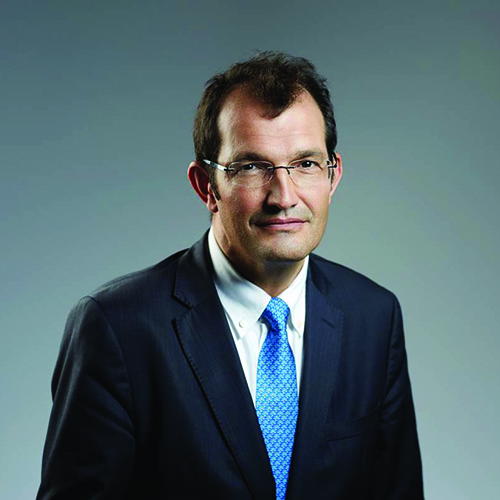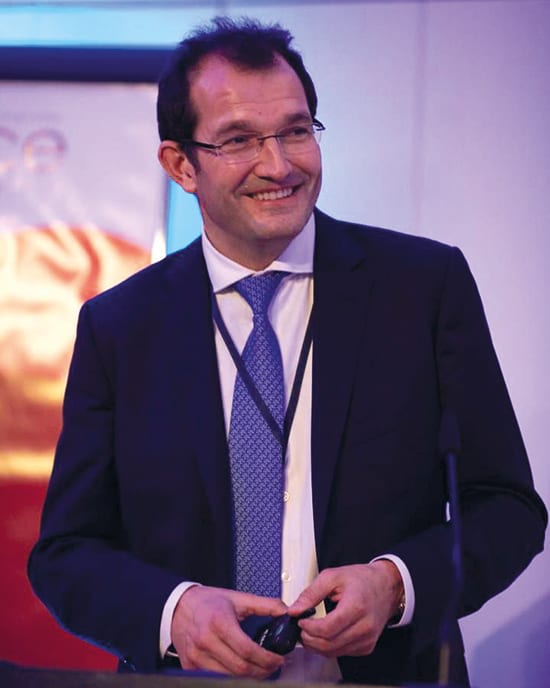

- Jean-Marc Servat
- Chair, EACT
My Life in Treasury

Jean-Marc Servat, Chair, EACT
Readers of TMI will be familiar with Jean-Marc Servat, who has been Chair of the European Association of Corporate Treasurers (EACT) since 2015. After more than 20 years in large multinational companies, he has worked as an independent consultant in treasury, finance and risk since 2013. In this feature, he describes his career to date, and offers some guidance to finance professionals new to treasury.
How did you come into treasury and what attracted you to the profession?
Like some people, my treasury career really started by accident. Once I had graduated from business school, with strong financial skills, I started my career in a sales role at Dow Chemical. In particular, I was keen to develop some commercial experience which is more difficult to acquire at business school. During the three years I spent in this role, I became acquainted with Dow’s credit team, who visited customers and analysed data in order to set credit limits and were the financial advisors of the commercial organisation. Credit management was part of treasury, and it was appealing to me as it combined financial analysis with commercial exposure to the business, which is how I became part of treasury.
I was part of Dow Chemical’s European treasury centre. The global team comprised around 60 people, of whom half were involved in credit management. Although it is unusual for credit to be part of treasury, it was a very good way of maintaining proximity between treasury and the wider business. I became more involved in ‘classic’ treasury activities during my time there, including risk management and analytics, and realised that treasury was where my strengths and interests were best suited. Dow was one of the first customers of SAP, an early adopter of new techniques such as value at risk when it was first introduced so it was a very motivating environment.
How did your career progress through to the role that you hold today?
Having identified treasury as my career path, I needed to develop my experience across the range of activities that it encompasses – which was one of the reasons for treasury’s appeal. After 10 highly rewarding years at Dow Chemical, during which time I also moved from France to Switzerland, I joined Nokia’s global treasury centre in Geneva in 2001, during Nokia’s ‘boom’ years. This was a very different, although equally motivating environment, and I was engaged with a number of different projects including risk management and analytics, and calculating the group’s target cash buffer. I became globally in charge of FX exposures management.
After five years, and a total of 15 years working with multinational corporations, I wanted to gain some banking experience, so I went to Citi in London working for the FX structuring team. It was a very interesting role, but I missed the breadth and diversity of corporate treasury, and the more personal internal and external relationships. I therefore decided to return to Switzerland and became head of treasury at LITASCO, the trading arm of LUKOIL, an energy company formed from the previous USSR Ministry of Energy. This was a new experience once again, but in particular enabled me to build some knowledge of trade finance which I had not done previously.
Early in 2008, I became head of treasury for Cisco’s EMEA and Asia Pacific treasury centre in Lausanne, Switzerland. It was good to be back in the technology industry, and I liked the culture and diversity of the business. Interestingly, despite the wide geographic remit of the role, I travelled very little as we made extensive use of high-end video conferencing, an early adopter of our own technology. I spent over five years at Cisco, but then decided to move into a consulting role, which I had been considering for some time. Whilst at Cisco, I had also been Chair of the Swiss Association of Corporate Treasurers as I am firmly committed to the role of national treasury associations in furthering treasury practice in their respective countries. Shortly after setting up my consulting business, the opportunity arose to take over from Richard Raeburn as Chair of the EACT. I was very motivated to take on this role to harness the skills and energies of the national treasury associations, and work together to represent the broader interests of the profession. Corporate treasury is a very diverse and dynamic community, and it is a privilege to be involved in representing the interests of a profession from which I have derived so much professional and personal satisfaction.
How have demands and needs in terms of treasury changed over the course of your career, and what particular skills does it now require?
In many respects, the skills and characteristics of a good corporate treasurer have not changed, but corporations are structured in different ways. For example, I was fortunate to be able to engage with customers extensively during my time at Dow and at Cisco, and it has been very important to me ever since to maintain proximity to the business. However, I know that other treasurers have found it more difficult to transition from a relatively isolated department to become more connected and act as an enabler for the business. Treasury’s role was accentuated following the global financial crisis as treasury gained the attention of senior management, which has also given more opportunity to extend its influence.
Treasury’s approach has changed since the late 1990s. In particular, treasurers take far less of a ‘view’ of the market, and are now more policy-driven rather than trying to second-guess market changes. This is a positive shift, and allows treasurers to engage with the needs and risks of the business, rather than becoming distracted by the potential to generate returns through the financial markets.
Technology has proved transformative over the past twenty years, but treasurers need to consider the opportunity not only to use technology solutions to safeguard assets and measuring risk, but also to contribute more proactively to the business itself.
[[[PAGE]]]
What qualities do you look for when recruiting for a treasury department?
The specific skills and experience required will obviously depend on the role in question, but there are also some universal qualities that are important to every treasury position. At the top of this list is integrity: as Warren Buffett allegedly said, ‘When hiring someone, you’re looking for three things, in a person: intelligence, energy and integrity. And if they don’t have the last one, the first two will kill you.”
Attention to detail is also important in every treasury role: treasurers deal with large transactions and significant risks, so the detail is very important. Treasurers also need to be able to thrive in a diverse, international environment. I would also emphasise the importance of humility. We all have strong opinions, but even the best people have been proven wrong many times, so people need to be open-minded. Humility is essential for development.
Hiring managers can be quite difficult in treasury. Treasury is a small business function, and people usually progress in their careers by developing specialist skills. However, while they may be excellent at their respective specialism, they may not necessarily be good managers. Consequently, people need to be able to demonstrate soft skills as well as technical skills, and avoid the temptation to micro-manage.
How important do you think a formal treasury education is, as opposed to (or as well as) more general finance or accountancy qualifications?
This is a very good question, and a lot depends from where in the world you are answering it. In the UK and US, for example, the national treasury associations offer dedicated treasury education, but this is not the case in every country. One of the reasons for this is, perhaps, the variations in education systems. In the UK, for example, students tend to specialise in their academic studies quite early, so new graduates coming into a profession such as treasury may offer quite diverse skills and knowledge, therefore there is a need for a specific professional certification. Conversely, in many other European countries, education is broader for longer so there is less need to bring people to a common level of financial literacy and skill.
However, continuing professional development and learning is essential for everyone, at every stage in their careers. Given that treasury covers a very diverse and broad range of disciplines, from operational, analytic to strategic, specialist treasury training and education may be very valuable for some roles. In other, more strategic roles, an educational background in business management may be more relevant.
Based on your career so far, what would your advice be to finance professionals who are in their first treasury role?
It is important to think about why you are in your job. Is it part of a rotation through different parts of the finance function? Or is it a step towards a specialised treasury career? What do you enjoy and what motivates you – is it the technical or analytic side? People management? International? If treasury is one step in a broader finance career, you may want to be exposed to many treasury activities quickly to develop an appreciation of the breadth of the department. If you are pursuing a career in treasury, you are unlikely to change jobs regularly as it’s a small business function, so you need to consider how will you keep renewing yourself.
What would your ideal vacation be?
I love exploring the natural world, from climbing a mountain to scuba diving.
What book have you read, or movie have you seen recently that you would recommend, and why?
Some time ago I read Child 44 a thriller by Tom Rob Smith, featuring a serial killer in Stalin’s Soviet Union. I thoroughly enjoyed the book, although less so the film. It has all the ingredients of a good thriller, but in a fascinating setting. I tend to read a lot of technical books too: the new material which is coming out on artificial intelligence is compelling but quite terrifying.









